by Rona | Nov 3, 2021 | KPFA, Podcasts, Radio Shows
“In an average day, 17 veterans die by suicide — not in a far-off place, but right here at home. Two service members die by suicide every day of the year. They’re our daughters. Our sons. Parents. Spouses. Siblings. Beloved friends and battle buddies… Each of these precious lives leaves behind loved ones who feel their absence every single day, like a black hole in the middle of their chests.” —President Biden, CNN 11/2/21
Suicide is a major public health issue and among the top ten causes of death in the United States. More veterans die by suicide than in combat.
My guest discussed why it’s important to rethink our approach to suicide prevention and consider what is being done wrong since rates continue to rise. It’s time to reduce the stigma and blame around suicide and rethink how we can change things as a society instead of only seeing death by suicide as the result of a mental illness.
Listen Now to About Health—KPFA.org, 94.1FM (11/8/21)
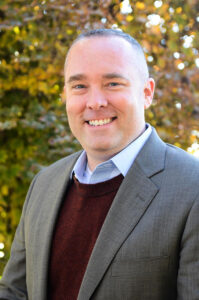
Guest: Craig J. Bryan, PsyD, ABPP, is a board-certified clinical psychologist and the Stress, Trauma, and Resilience (STAR) Professor of Psychiatry and Behavioral Health at The Ohio State University Wexner Medical Center. He is the author of “Rethinking Suicide, Why Prevention Fails, and How We Can Do Better. His research on suicide has led to the development and refinement of interventions that significantly reduce suicidal behaviors, and has been featured in major media outlets including Scientific American, CNN, Fox News, NPR, USA Today, New York Times, and the Washington Post. Dr. Bryan has published hundreds of scientific articles and multiple books, and has received numerous awards and recognitions for this work.
24 hour National Suicide Prevention Lifeline: 800-273-8255
(Languages: English, Spanish)
by Rona | Oct 25, 2021 | KPFA, Podcasts, Radio Shows
Listen now for the show we did on 10/25/21 on About Health—KPFA.org 94.1FM

Harry McIlroy, MD is an integrative physician certified with the Institute for Functional Medicine. He has a background in nutrition and holds a Master’s degree in acupuncture and Chinese medicine. He is the Clinical Director of BioReset Medical’s San Francisco office. He has practiced integrative medicine for over 25 years and is a leading expert in nutritional and plant based medicines, including medical cannabis. He continues his focus on treating chronic disease with Functional and Regenerative medicine and Dr. Harry strives to provide patients with health tools that empower them to improve their well being.
by Rona | Oct 8, 2021 | KPFA, Podcasts, Radio Shows
Listen now to About Health on KPFA.org, 94.1FM—10/11/21
Join this dynamic mother and daughter team who have been working tirelessly to show that “Plant-centered eating can help restore our damaged ecology, address the climate crisis, and move us toward real democracy.” We talked about how changing yourself and the world can start with changing the way we eat.
“Without changing our diets, agriculture alone could make it impossible to stay within the greenhouse gas essential limit of 1.5 degrees centigrade.” —small planet institute.
Anna Lappé, Co-founder of Small Planet Institute, is a national bestselling author, a respected advocate for sustainability and justice along the food chain, and an advisor to funders investing in food system transformation. She leads Real Food Media, based at Corporate Accountability International, which she founded to bring together leading food and farm organizations to produce powerful communications initiatives to inspire, educate and grow the movement for sustainable food and farming. Her most recent book is Diet for a Hot Planet: The Climate Crisis at the End of Your Fork and What You Can Do About It. She also helped edit the recipe section of the new, 50th anniversary edition of her mother’s book, Diet for a Small Planet. A James Beard Leadership Awardee, Anna is the co-author or author of three books on food, farming, and sustainability and the contributing author to thirteen more. In more than two decades of organizing, Anna has helped direct millions of dollars to advocate for food justice and sustainability around the country and the world. Anna’s research on food systems has taken her to more than 25 countries and 100 US cities. In addition to her philanthropy through the Small Planet Fund, Anna is the director of the Food & Democracy program of the Panta Rhea Foundation and is an active participant of several funder collaboratives building more just and sustainable food systems worldwide.
by Rona | Sep 9, 2021 | KPFA, Podcasts, Radio Shows
The Embodied Mind shows us that the mind is not constrained to the brain. Our mind relies on all of the cells in our body…it’s more like a network than one specific location. And what does epigenetics teach us about our environment and the part it plays regarding our health and happiness?
Listen now to About Health, KPFA.org, 94.1 FM—9/13/21
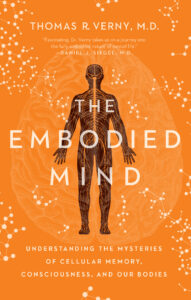
“Genes don’t make us who we are. Gene expression does. And gene expression varies depending on the life we live. In other words, the food we eat, the water we drink, the air we breathe, our interpersonal relationships, and our relationship to ourselves – they all affect us on a deep biological level which in turn affects our minds. Recent discoveries in epigenetics have made it abundantly clear how nature (genes) and nurture (the environment) work in concert. It is not one or the other that is responsible for a disease or personality trait. The only thing we know for sure is that we are the product of a dynamic interaction between these forces and that nothing about us is written in stone.“—Dr. Thomas Verny
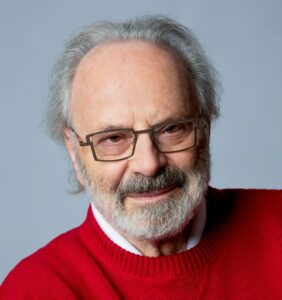
Thomas R. Verny is a clinical psychiatrist, academic, and author of eight of books and 47 scientific papers, including The Secret Life of the Unborn Child, which was published in 27 countries. His most recent book, The Embodied Mind, will be available on 10/5/21. He has participated in more than 250 newspaper, radio and TV interviews, including appearances with Donahue, Merv Griffin, Oprah, Sally Jessy Raphael, Barbara Walters, and Unsolved Mysteries—these interviews are available at trvernymd.com. He has taught at Harvard University, University of Toronto, York University (Toronto), and St. Mary’s University of Minnesota. Thomas lives with his wife in Ontario, Canada.
by Rona | Aug 26, 2021 | KPFA, Podcasts, Radio Shows
Listen now! KPFA.org—94.1FM, 8/30/21
Have you been putting off going to your doctor for routine care because of Covid-19? Do you have questions about the vaccines or other medical issues. The doctor is in.
Guest:
Dr. Hiten Patel is a family medicine doctor at the Ohio State University Wexner Medical Center where he provides care to patients of all ages and across all care settings. He has special interest in disease prevention and telemedicine. He has a passion for the use of technology in health care and how technology can improve the health of communities.
Patel is a family medicine doctor at the Ohio State University Wexner Medical Center where he provides care to patients of all ages and across all care settings. He has special interest in disease prevention and telemedicine. He has a passion for the use of technology in health care and how technology can improve the health of communities.
He was the Chief Resident at Ohio State University Family Medicine Program and has been a Gold Humanism in Medicine Honor Society Member since 2017.
by Rona | Aug 11, 2021 | KPFA, Podcasts, Radio Shows
These past years have brought to light so many questions to consider about our health, our countries health, and the health of our world. From the pandemic, to the insurrection, to our climate emergency—many of us have deep questions about what this unique time is teaching us and how we can survive as a species.
94.1FM, KPFA.org—About Health
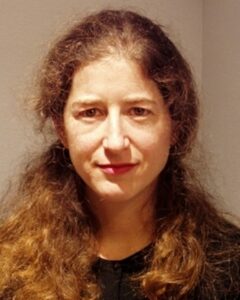
As seen on a Sussex Directories Inc site
Dr. Ariane Eroy is a psychodynamic and transpersonal psychologist who has spent 25 years working in community mental health clinics. (Her academic research focused on prisoner re-entry.) Her understanding is not merely informed by psychoanalytic psychology, politics, and the environment but also yoga, the works of Gurdjieff and Ouspensky’s Fourth Way, Alice Bailey’s Theosophy, the writings of Benjamin Creme, and the Masters of Wisdom on Esoteric Christianity.
She believes that modern psychology needs to foster diverse kinds of healing, and promote each individual’s evolutionary trajectory, as well as explore the psychological meaning underpinning social change.
Dr. Eroy maintains that the symbolic nature of events provides us with essential keys to our times. These keys can fortify us, while clarifying what is ours to do– especially in light of the the Climate Emergency, and as more and more people strategically work towards establishing peace, justice, and sharing moving forward.

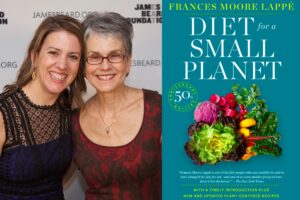 Frances Moore Lappé is the author or coauthor of twenty books, including the three-million copy Diet for a Small Planet, and just published is this book’s 50th updated anniversary edition. The Smithsonian’s National Museum of American History describes Diet for a Small Planet as “one of the most influential political tracts of the times.” Frances is co-founder of Oakland-based Food First and the Cambridge-based Small Planet Institute, which she leads with her daughter Ana Lappé. The recipient of twenty honorary degrees, Frances has been a visiting scholar at MIT and U.C. Berkeley and in 1987 received the Right Livelihood Award, often called the “Alternative Nobel.” New York Magazine dubbed her “Movement Mother” and Gourmet Magazine named her as one of 25 people—from Thomas Jefferson to Julia Child—whose work has changed the way America eats. She is a founding member of the World Future Council and serves on the National Advisory Board of the Union of Concerned Scientists. Frances is co-founder of three national organizations—Oakland-based Food First, the Center for Living Democracy, and her current home, the Cambridge-based Small Planet Institute, cofounded with her daughter Anna, and where her son Anthony Lappé, is Media Advisor.
Frances Moore Lappé is the author or coauthor of twenty books, including the three-million copy Diet for a Small Planet, and just published is this book’s 50th updated anniversary edition. The Smithsonian’s National Museum of American History describes Diet for a Small Planet as “one of the most influential political tracts of the times.” Frances is co-founder of Oakland-based Food First and the Cambridge-based Small Planet Institute, which she leads with her daughter Ana Lappé. The recipient of twenty honorary degrees, Frances has been a visiting scholar at MIT and U.C. Berkeley and in 1987 received the Right Livelihood Award, often called the “Alternative Nobel.” New York Magazine dubbed her “Movement Mother” and Gourmet Magazine named her as one of 25 people—from Thomas Jefferson to Julia Child—whose work has changed the way America eats. She is a founding member of the World Future Council and serves on the National Advisory Board of the Union of Concerned Scientists. Frances is co-founder of three national organizations—Oakland-based Food First, the Center for Living Democracy, and her current home, the Cambridge-based Small Planet Institute, cofounded with her daughter Anna, and where her son Anthony Lappé, is Media Advisor.




